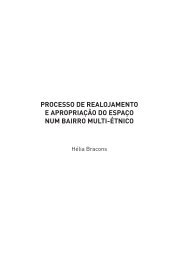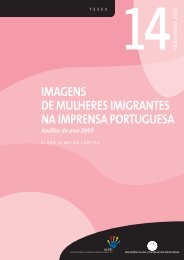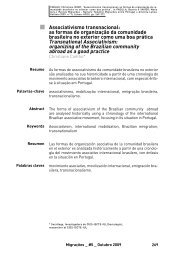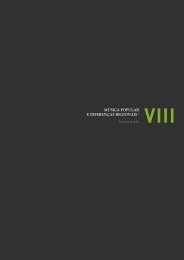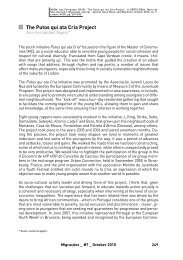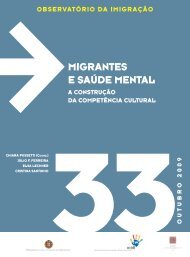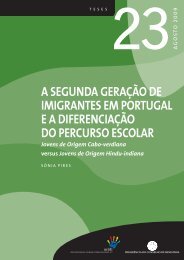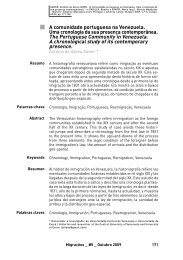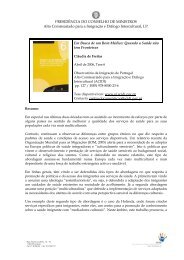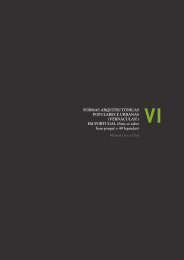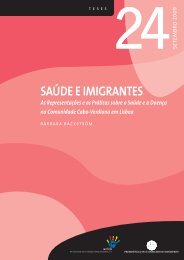Revising citizenship: migration and fado in the play of identities in ...
Revising citizenship: migration and fado in the play of identities in ...
Revising citizenship: migration and fado in the play of identities in ...
You also want an ePaper? Increase the reach of your titles
YUMPU automatically turns print PDFs into web optimized ePapers that Google loves.
cultural freedom “to preserve or to change our priorities” (Sen, 2006:113 <strong>in</strong> Appiah,2008:346).The frustration <strong>of</strong> <strong>fado</strong> participants <strong>in</strong> <strong>the</strong> Portuguese migrant group <strong>and</strong> elsewhere,I could underst<strong>and</strong> later, resulted from <strong>the</strong> old Portuguese <strong>of</strong>ficial “nationalconscience”(consciência nacional). There were still rema<strong>in</strong>s <strong>of</strong> it here <strong>and</strong> <strong>the</strong>re <strong>in</strong><strong>the</strong> m<strong>in</strong>ds <strong>of</strong> many <strong>in</strong> 1990, result<strong>in</strong>g from <strong>the</strong> strong national identity-belong<strong>in</strong>g feel<strong>in</strong>gthat <strong>the</strong> dictatorial “policy <strong>of</strong> <strong>the</strong> espirit”(política do espírito) efficiently <strong>in</strong>fused<strong>in</strong>to less critical ones. The case <strong>of</strong> <strong>fado</strong> was special with<strong>in</strong> <strong>the</strong> music scenario fornational <strong>and</strong> <strong>in</strong>dividual identity purposes. For <strong>the</strong> efficacy <strong>of</strong> <strong>the</strong> dictatorial services,among o<strong>the</strong>r factors, <strong>fado</strong> may be considered a supreme tool for popular subjugationto a unitary nationalist state ideology. Unexpectedly <strong>the</strong> political aim surpassed <strong>the</strong>regime.These <strong>fado</strong> participants faced a problem that Amartya Sen conceptualised as “one<strong>of</strong> <strong>the</strong> central issues… how human be<strong>in</strong>gs are seen” <strong>and</strong> how <strong>the</strong>y should be categorised.How to balance <strong>in</strong> <strong>the</strong> process <strong>in</strong>herited traditions <strong>and</strong> o<strong>the</strong>r affiliationssuch as those “<strong>in</strong>volv<strong>in</strong>g politics, pr<strong>of</strong>ession, class, gender, language, literature, social<strong>in</strong>volvements, <strong>and</strong> many o<strong>the</strong>r connections?” (2006:150 <strong>in</strong> Appiah, 2008:343-44).Chosen <strong>and</strong> unchosen <strong>identities</strong>, resultant from myriad affiliations such as national<strong>citizenship</strong>, place <strong>of</strong> residence, geographic orig<strong>in</strong>, class, politics, pr<strong>of</strong>ession, employment,food habits, sports <strong>in</strong>terests, music preference, social commitments, etc.,make us members <strong>of</strong> a variety <strong>of</strong> groups. Past <strong>and</strong> present conditions <strong>and</strong> forces, notall understood, rationally <strong>and</strong> emotionally constructed, channelled through body <strong>and</strong>m<strong>in</strong>d behaviours, <strong>in</strong>teracted <strong>in</strong> <strong>the</strong> <strong>play</strong> <strong>of</strong> <strong>identities</strong>. These participants lived thatnight as on o<strong>the</strong>rs, while try<strong>in</strong>g to expla<strong>in</strong> connections between <strong>fado</strong> <strong>and</strong> <strong>the</strong>ir ownPortuguese <strong>citizenship</strong> representation. Body action, aga<strong>in</strong>st <strong>the</strong> m<strong>in</strong>d’s conditionedreflection, <strong>play</strong>ed an active role <strong>in</strong> <strong>the</strong> liberation <strong>of</strong> <strong>the</strong>ir identity balance, through <strong>the</strong>forbidden Lat<strong>in</strong> dance <strong>of</strong> <strong>the</strong> day.Among <strong>the</strong> writ<strong>in</strong>gs about Portuguese national character abundant dur<strong>in</strong>g <strong>the</strong> dictatorship,demonstrat<strong>in</strong>g more than <strong>in</strong>terpret<strong>in</strong>g, I mention one by Jorge Dias, stress<strong>in</strong>g<strong>the</strong> ambiguity <strong>of</strong> <strong>the</strong> subject. By characteris<strong>in</strong>g Portuguese people he says: “itis a paradoxical people <strong>and</strong> difficult to govern. Its defects may be its virtues, <strong>and</strong> itsvirtues its defects, conform <strong>the</strong> aegis <strong>of</strong> <strong>the</strong> moment” 11 (1971:33 <strong>in</strong> Cabral, 2003:524).Although eventually more <strong>in</strong>terested on its virtues <strong>and</strong> defects, <strong>the</strong> fact is that Diasdraws attention towards <strong>the</strong> mean<strong>in</strong>g <strong>of</strong> <strong>the</strong> moment suggest<strong>in</strong>g openness to <strong>the</strong> <strong>in</strong>terpretiveaction <strong>of</strong> <strong>the</strong> observer, conditioned by <strong>the</strong> “aegis <strong>of</strong> <strong>the</strong> moment”, <strong>in</strong> o<strong>the</strong>rwords, <strong>the</strong> source <strong>of</strong> protection <strong>in</strong> power at that specific time <strong>and</strong> place.More than <strong>fado</strong> <strong>and</strong> my ethnographic questions, it was <strong>the</strong> “aegis <strong>of</strong> <strong>the</strong> moment”that prevailed. The body, awakened by <strong>the</strong> dance, faced <strong>the</strong> accepted nationalist narratives.The <strong>play</strong> <strong>of</strong> <strong>identities</strong> <strong>in</strong> which those participants were caught up made <strong>the</strong>mquestion <strong>the</strong>ir roles <strong>and</strong> <strong>in</strong>terpret <strong>the</strong> national character <strong>of</strong> <strong>the</strong>ir <strong>citizenship</strong> representation.Bodies conducted m<strong>in</strong>ds to <strong>the</strong> versatility, openness <strong>and</strong> diversity <strong>of</strong> <strong>the</strong>notion <strong>of</strong> identity. How did <strong>the</strong>y see <strong>the</strong>mselves? The question I did not pose seemedto worry <strong>the</strong>m <strong>in</strong> <strong>the</strong>ir discourse. The Forbidden Dance made <strong>the</strong>m pass from <strong>the</strong>Migrações _ #7 _ October 201083



